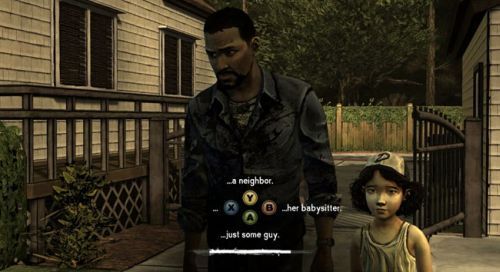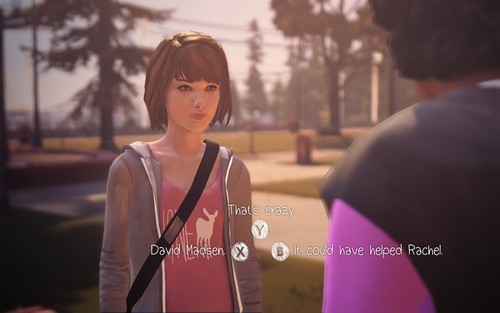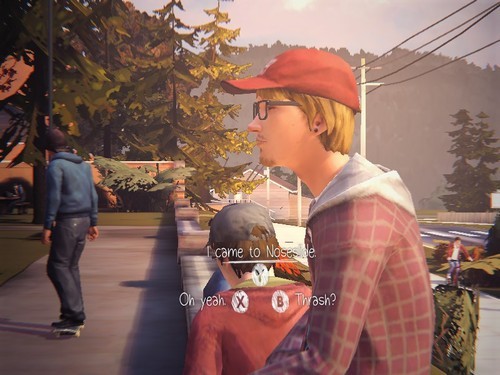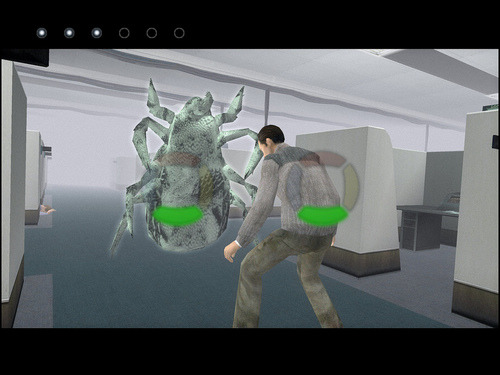Trending
Opinion: How will Project 2025 impact game developers?
The Heritage Foundation's manifesto for the possible next administration could do great harm to many, including large portions of the game development community.

Featured Blog | This community-written post highlights the best of what the game industry has to offer. Read more like it on the Game Developer Blogs or learn how to Submit Your Own Blog Post
Metagaming in story based games is usually discouraged by use of things like auto-saves and a single save file, but Life is Strange instead chooses to embrace it.

Metagaming is an interesting concept and problem. It is when the player uses knowledge they have but that the character they are playing as shouldn't have. Imagine you are playing a game with story choices in it and 5 minutes into the game you are asked if you want to jump in front of a gun to protect someone. The game wants to ask you if you will risk your character's life for another character, but the player knows that your character's life wasn't really in danger because there is so much game left, so they do it. They are using knowledge their character shouldn't have to inform the choices they make on behalf of that character, they are metagaming.

Instead of playing the game as the character they are playing the game with so much more knowledge of the world. The player might know how this situation will shake out, perhaps because they reloaded an earlier save to get a different outcome. They aren't making choices as the character.
The player reloading older saves is a good example of how a player can manipulate the rules of the game to accomplish the end that they want. Perhaps they make a mistake, or something happens that they don't like so they just undo it. This can be a problem for a lot of story based games. They want their choices to have weight and emotional impact but the player can choose to undo the consequences of their actions if they want.
A lot of games try to deal with this problem by locking shit down. The game auto-saves every 3 seconds and you aren't allowed to touch your own save data because we want to preserve the authenticity of the experience for you.

You will enjoy the game in the way we want you to and not in the way you want to!
The thing about metagaming is that it isn't necessarily a problem. Because honestly? I love metagaming.
Traditional books are linear, designed to be gone through in one way and with a single canonical story. Games though can have branching story lines, where so many different things can happen. Instead of trying to prevent people from doing the accursed metagaming what if we instead lean into it? Turn a game exploit into a game mechanic? Life is strange blessedly does just that.

I see this game compared a lot to The Walking Dead game but it isn't just that same system with a different story. It certainly uses a lot of mechanics that The Walking Dead refined but it's also its own thing mechanically as well.
I think everyone who has played a game with story choices in it has had an experience where the game gives you two options but after you make your choice your character does something you didn't expect at all or even vaguely wanted them to do. Hypothetical example: your Grandma has a rough day and the game gives you the options of "Make her comfortable" or "Go make a pizza". You choose "Make her comfortable" and then your character euthanizes her. You're now yelling at the screen because that isn't what you wanted at all. You just fucking wanted your character to be nice to them but the game had it's own idea on how to comfort her and you really don't get a say anymore.
This is the problem with choice in most games. Even if most choices in each game are able to avoid it it is a numbers game, some choices will be misinterpreted by some of your players. Because the choices are limited and they can't take into consideration the reasons you had for making that choice. For example if two of your party members are arguing you may choose to side with one of them for perfectly valid reasons even though you think it is a complicated multi-sided issue. But when you input that choice into the game the game will ascribe all sorts of reasons for your choice that may have nothing to do with why you actually wanted that side. A "I agree with you even though everything you are saying is wrong" kind of thing. When something like this happens to me my typical reaction is to instantly reload my most recent save file because fuck that shit.
But what starts as a measure only taken under dire circumstances has become a more standardized practice. This is because if I'm enjoying the story then I have the tendency to want to explore the story. Not just in one way, but to also explore the game's possibilities. I want to see how peoples reactions change and how world shifts based on my actions. I can get a clearer picture of who the characters are when I get to see them from many perspectives and how they react to the same thing in different contexts. That isn't possible unless you are able to compare how your choices effect everything around them.
Normally doing this involves a lot of save files, reloading, and all that jazz. Life is Strange though put a time travel mechanic right in the game that made all that work complete unnecessary.
Maxine, the main character in Life is Strange, can rewind time. She can talk to someone, and choose to interact with them one way only to then go back and redo that conversation making completely difference choices. This means you get to see how your choices play out and then you get to choose what you want to have happen. All that evil metagaming a player might be doing is turned into regular gaming mechanic because those choices and actions become contextualized in the world of the game.

She mostly seems to use it to fish for information and then go back in time and to use it to make other kids think she is cool. This is probably how most high schoolers would use it though so it is probably pretty accurate (adults too).
In the case of Life is Strange doing so changed it from one where you are trying to do the correct things in the moment to one where you are trying to find the best possible outcome (in your opinion) for everyone. One where you travel through time and recalculate your choices in order to try and help people and solve crime. In that way it becomes about what choices you make and how they effect everything and not just about how you think they will effect everything.
It realizes that it is a game and incorporates that into the story it is trying to tell and it is the better for it.

The time travel mechanic does kill of the option of having Quick Time Events. I mean if you can rewind time whenever you want hitting prompts on the screen becomes extremely easy. On the other hand, fuck QTE. QTE doesn't draw a player into the story, it pushes them out of it. If the player knows or suspects a QTE is coming the last thing they want to do is actually look at what is going on with the characters in the story. They want to watch for the indicators and ignore all the plot going on behind those QTE prompts.
Now I'm not saying that every game needs to embrace metagaming, there are certainly times and games where it ins't ideal to so thoroughly enable it. But it is important to remember that the structural differences of a game aren't flaws that need to burned out of the game. They can be used to make a story that can only be told in games.
Does that make sense?
Read more about:
Featured BlogsYou May Also Like